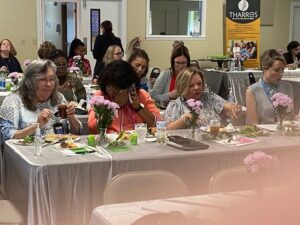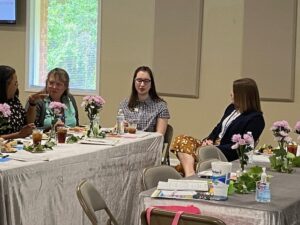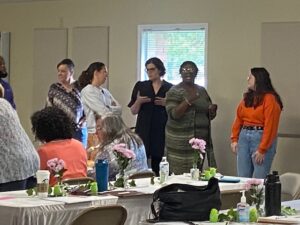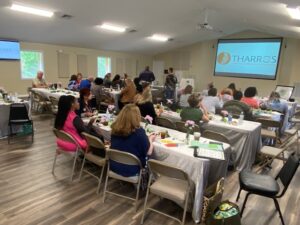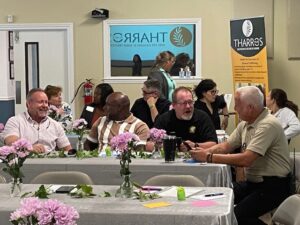An EFC Hosted Event:
A special thanks to:
- Our presenters: Kate Templeton (Tharros Place) and Laura Weatherly (Hope Court)
- Effingham County Sherrif’s Office
- Simply Southern Caterers
- CareSource and Carlson & Co.
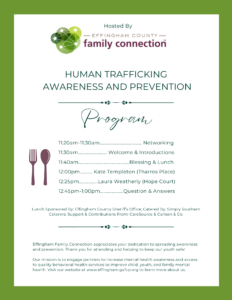
Article Written by Mark Lassiter with Effingham Board of Commissioners.
SPRINGFIELD – It isn’t uncommon for victims of human trafficking to not realize that they are tangled in a web of deceit.
That message was stressed repeatedly by representatives of two Chatham County organizations during a lunch-and-learn program at the Effingham Health System Education Building on Thursday. The event, hosted by Effingham Family Connection, featured speakers from Tharros Place and HOPE Court.
Tharros Place, set to open in September, is a nonprofit organization that will provide support and shelter for female survivors of human trafficking between the ages of 12-17. Modeled after a voluntary program initiated in Washington, D.C., HOPE Court works with Chatham County Juvenile Court and other agencies to protect youth victims of commercial sexual exploitation.
“We are seeing a lot of family-facilitated trafficking where parents and other relatives are trafficking youth,” Tharros Place Outreach Coordinator Kate Templeton said. “We are seeing runaway and homeless youth being trafficked. We are not seeing people being snatched up from gas pumps or being brought over in container ships from other countries.
“Those are some common misconceptions when people talk about what human trafficking is.”
Human trafficking is the unlawful act of transporting or coercing people in order to benefit from their work or service, typically in the form of forced labor or sexual exploitation. Weatherly, a HOPE Court coordinator, explained that the definition differs when a minor is involved.
“If you are under the 18, you do not need force, fraud or coercion to have a human trafficking situation,” she said.
Templeton said most human trafficking victims are female. She added that she believes that the number of male victims is vastly underreported, however.
“It is definitely important to support the male victims and realize that it is something that happens to them, too,” she said. “We need to support them and try to get more resources for them in the state.”
Georgia has a total of 55 beds for female human trafficking survivors.
Weatherly said the exchange of anything of value for a sex act – even a McDonald’s Happy Meal — qualifies as sex trafficking. She went on to say that perpetrators often use visits to a hair stylist, manicurist or makeup store to entice young victims. New cellphones are a ploy, too.
Weatherly said it is important not to label sex trafficking victims “child prostitutes.”
“There is no such thing,” Weatherly said. “They cannot consent. They cannot do it.”
Weatherly said children living in poverty and other challenges can be vulnerable to traffickers. Kids without their own room or bed can be swayed by promises of things like a stay in a hotel in Savannah.
“They think they are going to something better,” Weatherly explained. “… They get caught up in a situation that they are unable to escape from. They don’t know.”
Some victims struggle to understand how they were manipulated or groomed even after they are rescued from trafficking situations.
“… they don’t think they were victimized or that a crime actually occurred,” Weatherly said.
“If somebody is trafficked at six years old, they are not going to know what human trafficking is,” Templeton said later in the presentation. “They are not going to understand what is happening to them so it is real important to educate our middle schoolish group about this issue.”
There are more than 700 reported minor victims in Georgia. Effingham County reported only one case in 2021 but it is possible, even likely, that there were more.
Savannah is a hotspot for human trafficking because it is a tourist attraction with a constant influx of people. The number of cases it had in 2021, which was also impacted by poverty and homelessness, was the fourth most in Georgia.
Globally, it is estimated that there are more than 25 million human trafficking victims.
“It’s a billion dollar-a-year industry,” Weatherly said. “,,, There is a demand. Drug traffickers have to make more drugs. They have to make them, they have to produce them, put them somewhere and then you have to move them.
“With this, our (human) traffickers can sell one thing over and over and over and over again, and make the same kind of money over and over and over again.”
Perpetrators of human trafficking vary. It would be wrong to assume that they are always male.
“It can be someone who works at the church,” Weatherly said. “It could be someone who works at an agency that works with you. It could be a teacher, a pastor, a mentor …”
Risk factors of human trafficking include:
Homelessness
Poverty
Lack of education
Poor employment opportunities
Sexual or physical abuse
Age
Family history of drug use
LGBTQ+
Lack of support networks
History of systems involvement
Disabilities
Low self-esteem, self-confidence or self-worth
The average age at which girls become trafficking victims is 12-14. The average is 11-13 for boys and transgender children.
“Traffickers know which kids to target. They know which kids are vulnerable,” Templeton said.
Templeton and Weatherly warned that human traffickers frequently use social media to lure victims.
“Being online really opens the access to every child,” Templeton said.
Signs that a child might be a victim of human trafficking include:
Appearing malnourished
Signs of physical injury
Rehearsed responses in social interaction
Checking into hotels with older males
Tattoos/branding on neck or back
Poor physical or dental health
Lacking identification documents
“A big one for people who see the same children every single day is new hair, new clothes, new items and things like that,” Templeton said. “If you see one child who never has new clothes and their hair is never done, and they don’t have a phone and things like but — all of a sudden — they always have their hair done and they always have new clothes, and they a new iPhone, that can be a red flag.”
• To report suspected human trafficking in Georgia, call the Statewide 24-Hour Human Trafficking Hotline at (866) 363-4842.
• If you have reason to believe that a victim is in imminent danger, call 911 or your local law enforcement agency to file a report.
• For more information on how to get help for both national and foreign-born victims of human trafficking, visit www.endhtga.org.
• To learn more about Tharros Place, visit www.tharrosplace.com or call 912-332-2455.
